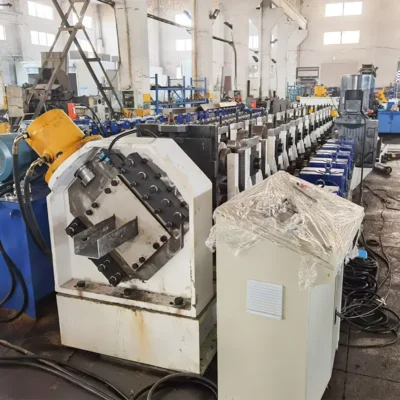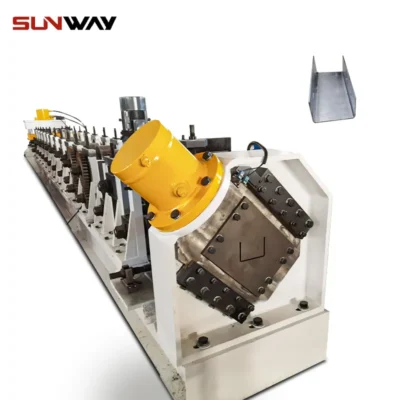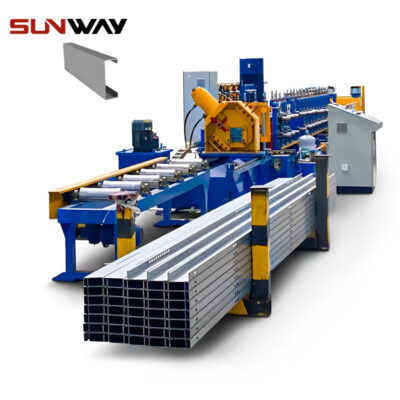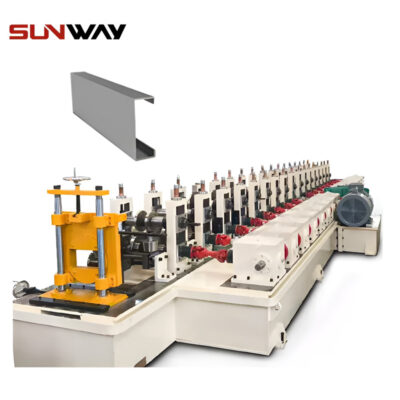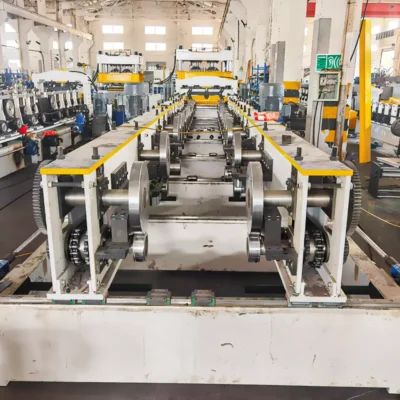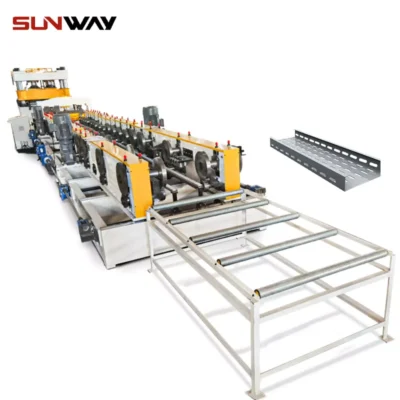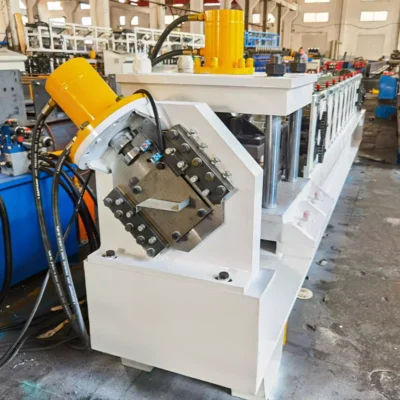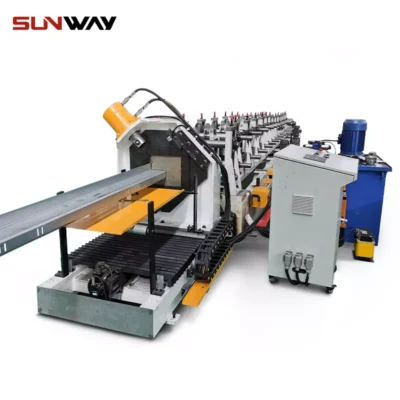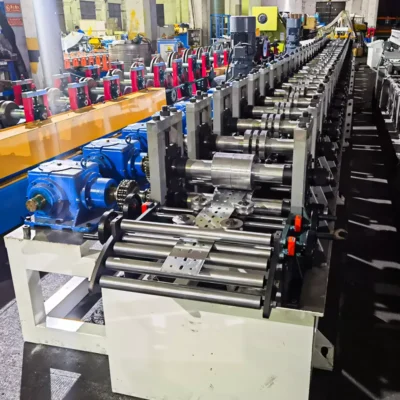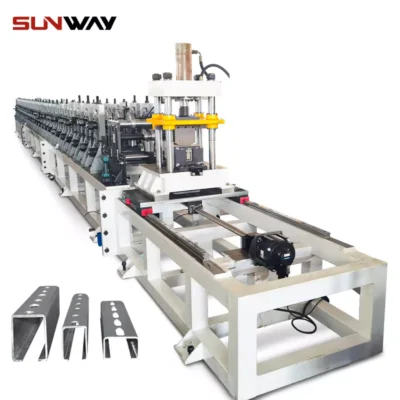The textile industry is one of the largest and most dynamic manufacturing sectors globally, with an ever-growing need for efficient and durable storage solutions. Textile racks, designed to store rolls of fabric, yarns, and other materials, are essential for smooth inventory management in warehouses, production facilities, and retail outlets. Behind the production of these racks lies a critical piece of industrial machinery: the Textile Rack Roll Forming Machine.
These machines are specialized to produce high-quality metal profiles used in textile rack systems. With the demand for optimized storage systems on the rise, Textile Rack Roll Forming Machines are becoming indispensable for manufacturers catering to the textile industry’s needs. This article will dive deep into what these machines are, their applications, pricing, features, troubleshooting tips, and future trends, and why Wuxi Sunway Machinery is the go-to partner for roll-forming solutions.
What Are Textile Rack Roll Forming Machines?
Textile Rack Roll Forming Machines are industrial machines engineered to produce metal profiles that form the framework of storage racks used in textile facilities. These machines transform raw metal coils into precise profiles, including beams, uprights, and crossbars, which are then assembled into textile racks.
Textile racks must support the weight of fabric rolls and other materials while maintaining durability, stability, and resistance to wear and tear. Roll-forming machines ensure these racks are manufactured with precision and consistency, meeting the specific demands of the textile industry.
Key Features of Textile Rack Roll Forming Machines
- High Precision: Produces profiles with exact dimensions for seamless rack assembly.
- Material Versatility: Processes galvanized steel, cold-rolled steel, and stainless steel.
- Customizable Designs: Supports various rack configurations, including heavy-duty and modular designs.
- High-Speed Production: Enables large-scale manufacturing to meet industrial demands.
- Durability: Creates components resistant to corrosion, wear, and heavy loads.
- Automation: Reduces labor costs and ensures consistent product quality.
Applications of Textile Rack Roll Forming Machines
Textile racks are essential across the textile value chain, from manufacturing facilities to retail stores. Below are some key applications of Textile Rack Roll Forming Machines:
1. Fabric Storage Racks
- Use Case: Producing upright beams and crossbars for racks designed to store fabric rolls.
- Why It’s Essential: Ensures safe and organized storage of bulky fabric rolls, optimizing inventory management.
2. Yarn and Thread Storage Systems
- Use Case: Manufacturing profiles for racks used to store spools of yarn, thread, and other small materials.
- Why It’s Beneficial: Prevents tangling and damage, maintaining the quality of raw materials.
3. Modular Textile Racks
- Use Case: Crafting components for modular racks that can be customized and adjusted based on storage needs.
- Why It’s Important: Enhances flexibility, allowing facilities to reconfigure storage systems as inventory changes.
4. Heavy-Duty Racks for Industrial Use
- Use Case: Producing heavy-duty profiles for racks used in textile production facilities to store machinery parts and tools.
- Why It’s Relevant: Provides robust storage solutions capable of withstanding heavy loads and frequent use.
5. Retail Display Racks
- Use Case: Creating profiles for racks used in textile retail stores to display fabrics, garments, and accessories.
- Why It’s Necessary: Combines functionality with aesthetic appeal to create visually appealing displays.
6. Automated Storage and Retrieval Systems (ASRS)
- Use Case: Manufacturing components for racks used in automated storage systems in large-scale warehouses.
- Why It’s Innovative: Enhances efficiency by integrating storage with automated retrieval, reducing labor costs.
Key Features of Wuxi Sunway Textile Rack Roll Forming Machines
When it comes to textile rack production, Wuxi Sunway Machinery offers cutting-edge roll-forming solutions that stand out for their precision, reliability, and versatility. Below are the key features of their roll-forming machines:
1. Material Compatibility
- What It Processes: Galvanized steel, cold-rolled steel, and stainless steel.
- Why It’s Versatile: Accommodates various materials to meet the specific requirements of textile rack applications.
2. Precision Engineering
- What It Delivers: Produces profiles with exact dimensions and consistent quality.
- Why It’s Critical: Ensures components fit together seamlessly, reducing assembly time and costs.
3. Modular Design Capabilities
- What It Supports: Quick-change tooling for producing profiles of different sizes and configurations.
- Why It’s Flexible: Allows manufacturers to create racks tailored to specific storage needs.
4. High-Speed Production
- What It Achieves: Processes up to 30 meters of metal per minute, depending on material thickness and profile complexity.
- Why It’s Essential: Meets the high-volume demands of textile manufacturers and storage solution providers.
5. Integrated Cutting and Punching
- What It Includes: Built-in systems for precision cutting and punching holes for assembly.
- Why It’s Efficient: Reduces production time and ensures components are ready for immediate use.
6. Automation and IoT Integration
- What It Incorporates: IoT-enabled systems for real-time monitoring, predictive maintenance, and remote control.
- Why It’s Innovative: Enhances operational efficiency while minimizing downtime and maintenance costs.
7. Durability and Reliability
- What It Ensures: Machines are built for continuous, high-volume production without compromising quality.
- Why It’s Important: Guarantees consistent performance even in demanding industrial environments.
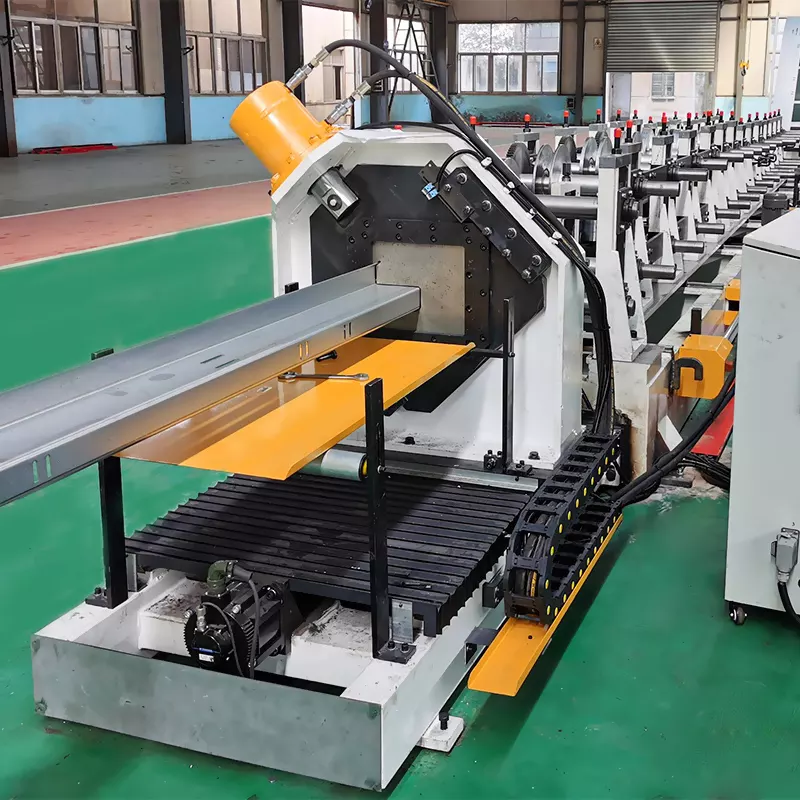
Pricing of Textile Rack Roll Forming Machines
The cost of a Textile Rack Roll Forming Machine depends on its features, production capacity, and customization options. Below is a general pricing guide for 2025:
| Machine Type | Capabilities | Price Range (USD) |
|---|---|---|
| Basic Machines | Standard rack profile production | 150,000–150,000–150,000–300,000 |
| Advanced Machines | High-speed production with integrated systems | 300,000–300,000–300,000–600,000 |
| Customizable Machines | Tailored for unique rack designs and applications | 600,000–600,000–600,000–1,200,000 |
For detailed pricing and financing options, contact Wuxi Sunway Machinery.
Advantages of Using Textile Rack Roll Forming Machines
Textile Rack Roll Forming Machines offer manufacturers several advantages, making them a valuable asset for the textile storage industry:
1. High Production Efficiency
- Why It’s Beneficial: Enables the mass production of rack components, meeting the growing demand for textile storage solutions.
2. Customization
- Why It’s Valuable: Supports the creation of components tailored to specific rack configurations and load capacities.
3. Consistent Quality
- Why It’s Critical: Ensures all components meet strict quality standards, enhancing the durability and reliability of textile racks.
4. Cost Efficiency
- Why It’s Practical: Reduces material waste and labor costs, lowering the overall production expense.
5. Scalability
- Why It’s Relevant: Meets the needs of small-scale manufacturers and large industrial operations alike.
6. Eco-Friendly Manufacturing
- Why It’s Important: Processes recyclable materials and minimizes waste, aligning with sustainable manufacturing practices.
Troubleshooting Common Issues with Textile Rack Roll Forming Machines
Even the most advanced machines may encounter operational challenges. Here are some common issues and their solutions:
1. Irregular Profile Dimensions
- Symptoms: Rack components do not meet specified dimensions, causing assembly issues.
- Possible Causes: Misaligned rollers or incorrect machine calibration.
- Solution:
- Recalibrate the machine and ensure proper roller alignment.
- Conduct routine quality checks during production.
2. Material Feeding Issues
- Symptoms: Material jams or feeds unevenly, causing production delays.
- Possible Causes: Poor-quality material or misaligned feeding system.
- Solution:
- Use high-quality, uniform materials.
- Realign the feeding system for smooth operation.
3. Surface Scratches on Components
- Symptoms: Rack components have visible scratches or blemishes, compromising their aesthetic appeal.
- Possible Causes: Worn-out rollers or improper material handling.
- Solution:
- Replace damaged rollers.
- Implement better material handling procedures.
FAQs About Textile Rack Roll Forming Machines
| Question | Answer |
|---|---|
| What materials can these machines process? | Galvanized steel, cold-rolled steel, and stainless steel. |
| What is the production speed? | Up to 30 meters per minute, depending on material and profile complexity. |
| Can these machines produce custom designs? | Yes, modular tooling supports bespoke profiles for diverse textile rack applications. |
| Are these machines eco-friendly? | Yes, they minimize material waste and support recyclable materials. |
| What is the price range for these machines? | Prices range from 150,000to150,000 to 150,000to1,200,000, depending on features and customization. |
| Do these machines support IoT integration? | Yes, IoT-enabled features allow real-time monitoring and predictive maintenance. |
Real-World Success Stories: How Textile Rack Roll Forming Machines Deliver Results
Textile Rack Roll Forming Machines have been successfully deployed in a variety of projects across the globe. Below are some real-world examples showcasing the transformative impact of these machines in the textile industry:
1. Optimizing Storage for a Fabric Manufacturer in Bangladesh
Client: A leading fabric manufacturer in Dhaka, Bangladesh.
Challenge: The client needed a cost-effective solution to organize and store over 10,000 fabric rolls across multiple warehouses.
Solution: Wuxi Sunway Machinery provided a roll-forming machine capable of producing lightweight yet durable profiles for large-scale fabric racks.
Outcome:
- Produced 15,000 rack components in just four months, meeting the client’s urgent timeline.
- Reduced warehouse clutter, increasing storage efficiency by 40%.
- Enabled better inventory management, improving production workflow and reducing material handling time.
2. Modular Yarn Racks for a Weaving Facility in Italy
Client: A weaving company specializing in high-quality yarns in Florence, Italy.
Challenge: The facility required modular racks that could be easily adjusted to accommodate different yarn spool sizes.
Solution: Wuxi Sunway supplied a machine with modular tooling capabilities, enabling the production of adjustable rack components.
Outcome:
- Produced over 5,000 modular rack profiles, allowing the facility to adapt to changing inventory needs.
- Reduced material waste by 20%, thanks to precise roll-forming technology.
- Improved the aesthetics of storage racks, aligning with the company’s premium brand image.
3. Heavy-Duty Racks for a Textile Exporter in Turkey
Client: A textile exporter in Istanbul managing bulk shipments of fabric rolls.
Challenge: The company needed heavy-duty racks capable of supporting large fabric rolls while withstanding the rigors of international shipping and warehouse use.
Solution: Wuxi Sunway provided a roll-forming machine optimized for producing high-strength profiles with advanced anti-corrosion coatings.
Outcome:
- Produced racks with a load capacity of up to 2,500 kg per shelf.
- Increased warehouse storage capacity by 35%, enabling the company to handle larger export volumes.
- Reduced rack maintenance costs, thanks to corrosion-resistant materials.
4. Retail Display Racks for a Textile Chain in the United States
Client: A retail chain specializing in textiles and home décor in California, USA.
Challenge: The client needed aesthetically pleasing display racks that could also support heavy fabric rolls and accessories.
Solution: Wuxi Sunway delivered a roll-forming machine capable of producing profiles for decorative and functional retail racks.
Outcome:
- Produced over 8,000 rack components, enhancing the visual appeal of retail displays.
- Increased customer accessibility to products, boosting sales by 15%.
- Improved rack durability, ensuring a longer lifespan in high-traffic retail environments.
Future Trends in Textile Rack Manufacturing for 2025
As the textile industry continues to evolve, so too does the demand for innovative storage solutions. Below are the key trends shaping the future of Textile Rack Roll Forming Machines and their applications:
1. Sustainability and Eco-Friendly Materials
- Trend: The textile industry is increasingly adopting sustainable practices, including the use of recyclable and eco-friendly materials.
- Impact on Machines: Roll-forming machines optimized for processing materials like aluminum and recycled steel will see higher demand.
2. Lightweight and Portable Racks
- Trend: Portable and lightweight racks are becoming popular for flexible storage solutions in retail and small-scale manufacturing.
- Impact on Machines: Machines capable of producing lightweight yet durable profiles will gain traction.
3. Automation in Textile Warehouses
- Trend: Automated storage and retrieval systems (ASRS) are transforming textile warehouses, making them more efficient and less labor-intensive.
- Impact on Machines: Roll-forming machines designed to produce components for ASRS systems will become industry staples.
4. Customization and Modular Design
- Trend: Modular racks that can be reconfigured to fit changing storage needs are in high demand.
- Impact on Machines: Machines with modular tooling capabilities will be essential for manufacturers catering to this trend.
5. Enhanced Aesthetic Appeal for Retail Racks
- Trend: Retailers are seeking racks that combine functionality with attractive designs to enhance the shopping experience.
- Impact on Machines: Machines capable of producing decorative profiles with smooth finishes will lead the market.
6. Expansion into Emerging Markets
- Trend: Rapid urbanization and industrialization in Asia, Africa, and South America are driving demand for cost-effective textile storage solutions.
- Impact on Machines: Affordable, high-efficiency roll-forming machines will be key to meeting the needs of these markets.
Innovations in Textile Rack Roll Forming Machines for 2025
The roll-forming industry is constantly innovating to meet the evolving needs of the textile sector. Here are the most exciting innovations to expect in Textile Rack Roll Forming Machines by 2025:
1. AI-Powered Quality Control
- What It Does: Incorporates AI systems to monitor and detect defects in real-time during production.
- Why It’s Valuable: Ensures consistent quality, reduces waste, and minimizes the need for post-production inspections.
2. Precision Laser Cutting
- What It Adds: Integrates laser cutting systems for creating intricate designs and holes in rack profiles.
- Why It’s Revolutionary: Enhances customization options without compromising production speed.
3. Multi-Material Processing
- What It Enables: Allows machines to switch between materials like galvanized steel, aluminum, and stainless steel without manual intervention.
- Why It’s Flexible: Expands the range of rack applications, from heavy-duty to lightweight solutions.
4. In-Line Coating Systems
- What It Integrates: In-line systems for corrosion resistance, fireproofing, or decorative coatings during the roll-forming process.
- Why It’s Game-Changing: Reduces production time and ensures racks are ready for immediate use.
5. Modular Machine Designs
- What It Offers: Machines that can be easily upgraded or modified to produce new rack profiles.
- Why It’s Sustainable: Extends the lifespan of the machine and reduces the need for new investments.

Why Choose Wuxi Sunway Machinery for Textile Rack Roll Forming Machines?
Wuxi Sunway Machinery is a global leader in roll-forming technology, delivering innovative solutions that cater to the unique needs of the textile industry. Here’s why businesses worldwide trust Wuxi Sunway:
1. Decades of Expertise
With years of experience in designing roll-forming machines, Wuxi Sunway has a proven track record of excellence.
2. Customization Excellence
Offers tailored machines to meet specific manufacturing requirements, from lightweight retail racks to heavy-duty industrial systems.
3. Cutting-Edge Technology
Integrates IoT, AI, and advanced automation into their machines, ensuring superior performance and efficiency.
4. Sustainability Commitment
Supports eco-friendly manufacturing practices by designing machines that process recyclable materials with minimal waste.
5. Global Reach
Trusted by clients across Asia, Europe, the Americas, and Africa, making Wuxi Sunway a truly international leader.
6. Comprehensive Support
Provides end-to-end support, including consultation, installation, training, and after-sales services.
Visit their official website to explore their offerings or contact them for a customized solution.
FAQs About Textile Rack Roll Forming Machines
| Question | Answer |
|---|---|
| What materials can these machines process? | Galvanized steel, cold-rolled steel, stainless steel, and aluminum. |
| What is the production speed? | Up to 30 meters per minute, depending on material and profile complexity. |
| Can these machines handle custom designs? | Yes, modular tooling supports bespoke profiles for diverse textile rack applications. |
| Are these machines eco-friendly? | Yes, they minimize material waste and support recyclable materials. |
| What is the price range for these machines? | Prices range from 150,000to150,000 to 150,000to1,200,000, depending on features and customization. |
| Do these machines support IoT integration? | Yes, IoT-enabled features allow real-time monitoring and predictive maintenance. |
Conclusion: Redefining Textile Storage Solutions
As the textile industry grows and innovates, Textile Rack Roll Forming Machines are becoming indispensable for manufacturing high-quality, durable, and customizable storage systems. From improving warehouse efficiency to enhancing retail displays, these machines are setting new standards in the industry.
Ready to streamline your textile rack production process? Partner with Wuxi Sunway Machinery and discover how their advanced roll-forming technology can elevate your business. Together, let’s shape the future of textile storage—one profile at a time.

